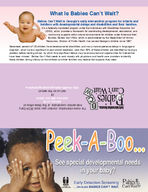What Is Babies Can't Wait?
Babies Can't Wait is Georgia's early intervention program for infants and toddlers with developmental delays and disabilities and their families.
It is a federally mandated program under the Individuals with Disabilities Education Act (IDEA), which provides a framework for coordinating developmental, educational, and community supports within natural environments for children under three and their families. Babies Can't Wait, which is administered by the Department of Human Resources, Division of Public Health, has served Georgia's children since 1987.
Seventeen percent of US children have developmental disabilities, and many more experience delays in language or cognition, which have a significant impact school readiness. Less than 50% of these children are identified as having a problem before starting school, by which time significant delays may have occurred and opportunities for intervention have been missed. Babies Can't Wait needs to work closely with physicians and health care providers to identify these children during infancy so that children and their families may receive the supports they need.
For more information, contact your local BCW Early Intervention coordinator, or the State office at: 404-657-2726 (toll-free 888-651-8224). Or visit us on the web at: http://health.state.ga.us/programs/bcw
"All infants and children should be screened for developmental delays"
American Association of Pediatrics Policy Statement
Why Early Identification and Support?
T
he brain develops most rapidly during our first three years of life, providing a brief window of opportunity to detect developmental delays in children and address them before they become barriers to healthy development. A significant body of clinical research, conducted in the past ten years, identifies the enormous benefits of intervention services provided to a child during these formative years.
"Estimated lifetime
costs of children
born in 2000 with
developmental
disabilities exceeds
$67 billion"
- From CDC Morbidity & Mortality
Weekly Report 1/30/04
HOW CAN BABIES CAN'T WAIT HELP?
ime constraints, staff
T
shortages and lack of funding can make following
up on early signs of delays
or disabilities difficult for doctors, but
the biggest barrier to healthy child
development is the ever-closing
window of opportunity for successful
intervention in children under three.
It is vital that infants and toddlers be
connected to intervention services
when they are at their most
receptive. Babies Can't Wait
can help.
Babies Can't Wait provides developmental evaluation, at no cost to the families, to determine
whether children are eligible for the program due to developmental delays or disabilities. For children who
are eligible,Babies Can't Wait works with the family to develop an Individual Family Service Plan (IFSP) that outlines desired child/family outcomes. The BCW program also provides service coordination to each eligible child and family, ensuring coordination of efforts and linking families with necessary resources and supports in their community.
WHEN SHOULD A REFERRAL BE MADE?
The best time to refer is at the earliest sign of a delay. We all know that children develop at different rates, but a "wait and see" approach progressively limits the benefits a child receives from later intervention supports, as developmental obstacles tend to increase in complexity and are harder to manage effectively as the child grows.
What Services Can BABIES CAN'T WAIT Provide for You and Your Families?
Evaluation of children's
A highly skilled staff of Physical
development in the cognitive,
Therapists, Occupational
socio-emotional, physical,
Therapists, Early Childhood
adaptive/self-help and
Educators, Speech and Language
communication areas and
Pathologists, Nutritionist, Social
identification of child/family
Workers and others to help
strengths and needs.
families and caregivers to, in
IFSP development and monitoring,
turn, support their children's development and participation
working with families to develop
within typical family routines
individual outcomes which
and activities.
promote children's development
and participation, as well as the
supports needed to achieve
those outcomes.
Individualized, comprehensive
service coordination, monitoring changes to the IFSP, coordinating supports, and connecting families with resources and referrals in the community that meet family needs and benefit the child's development
